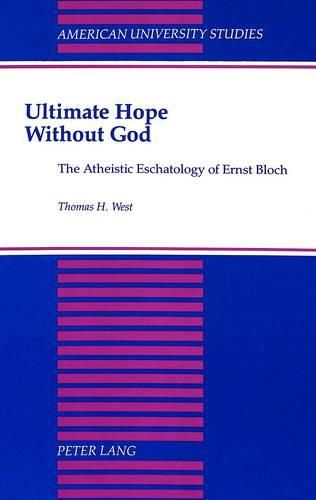Readings Newsletter
Become a Readings Member to make your shopping experience even easier.
Sign in or sign up for free!
You’re not far away from qualifying for FREE standard shipping within Australia
You’ve qualified for FREE standard shipping within Australia
The cart is loading…






The work of the German Marxist philosopher Ernst Bloch (1885-1977) is often referred to by theologians and philosophers of religion, but its enormous scope and complexity have made access to it difficult, especially for the English-speaking reader. Undergirded as it is by an ontology of hope, there is a pervasive tension in Bloch’s work that moves it in contradictory directions. This tension also manifests itself in his politics, which alternate between an uncritical support of Stalinism and an almost otherworldly detachment from any concrete socialist program. Bloch’s life and work, with a focus on his political allegiances, are thoroughly introduced in this book. Also, it offers a close reading of his greatest work, The Principle of Hope, an analysis of his philosophy of biblical religion, and a critical examination of his ontology of hope. Conversant with the latest scholarship and attentive to the needs of those who do not have easy access to the foreign language sources, this book is an ideal introduction to the work of Bloch, especially for those interested in his treatment of religion.
$9.00 standard shipping within Australia
FREE standard shipping within Australia for orders over $100.00
Express & International shipping calculated at checkout
The work of the German Marxist philosopher Ernst Bloch (1885-1977) is often referred to by theologians and philosophers of religion, but its enormous scope and complexity have made access to it difficult, especially for the English-speaking reader. Undergirded as it is by an ontology of hope, there is a pervasive tension in Bloch’s work that moves it in contradictory directions. This tension also manifests itself in his politics, which alternate between an uncritical support of Stalinism and an almost otherworldly detachment from any concrete socialist program. Bloch’s life and work, with a focus on his political allegiances, are thoroughly introduced in this book. Also, it offers a close reading of his greatest work, The Principle of Hope, an analysis of his philosophy of biblical religion, and a critical examination of his ontology of hope. Conversant with the latest scholarship and attentive to the needs of those who do not have easy access to the foreign language sources, this book is an ideal introduction to the work of Bloch, especially for those interested in his treatment of religion.